REKLAMA
Dziennik Ustaw - rok 2000 nr 87 poz. 968
KONWENCJA
o doręczaniu za granicą dokumentów sądowych i pozasądowych w sprawach cywilnych lub handlowych,
sporządzona w Hadze dnia 15 listopada 1965 r.
W imieniu Rzeczypospolitej Polskiej
PREZYDENT RZECZYPOSPOLITEJ POLSKIEJ
podaje do powszechnej wiadomości:
W dniu 15 listopada 1965 r. została sporządzona w Hadze Konwencja o doręczaniu za granicą dokumentów sądowych i pozasądowych w sprawach cywilnych lub handlowych w następującym brzmieniu:
Przekład
KONWENCJA
o doręczaniu za granicą dokumentów sądowych i pozasądowych w sprawach cywilnych lub handlowych
Państwa – sygnatariusze niniejszej konwencji,
pragnąc stworzyć odpowiednie środki dla zapewnienia, żeby dokumenty sądowe i pozasądowe, mające być doręczone za granicą, były przekazywane adresatom w odpowiednim czasie,
pragnąc w tym celu udoskonalić organizację wzajemnej pomocy prawnej przez uproszczenie i przyspieszenie postępowania,
postanowiły zawrzeć niniejszą konwencję i uzgodniły następujące postanowienia:
Artykuł 1
Niniejszą konwencję stosuje się w sprawach cywilnych lub handlowych we wszystkich przypadkach, gdy dokument sądowy lub pozasądowy ma być przekazany za granicę w celu doręczenia.
Konwencji nie stosuje się, gdy nie jest znany adres osoby, której dokument ma być doręczony.
Rozdział l
Dokumenty sądowe
Artykuł 2
Każde umawiające się państwo wyznaczy organ centralny zobowiązany do przyjmowania wniosków o doręczenie, pochodzących z innego umawiającego się państwa, oraz do postępowania zgodnie z postanowieniami artykułów 3 do 6.
Każde państwo ustanowi organ centralny zgodnie ze swoim prawem.
Artykuł 3
Organ lub urzędnik sądowy właściwy zgodnie z prawem państwa, z którego dokumenty pochodzą, przesyła do organu centralnego państwa wezwanego wniosek zgodny z wzorem załączonym do niniejszej konwencji bez potrzeby legalizacji lub innej równoznacznej czynności formalnej.
Do wniosku dołącza się dokument, który ma być doręczony, lub jego odpis. Wniosek i dokument powinny być dostarczone w dwóch egzemplarzach.
Artykuł 4
Jeżeli organ centralny uzna, iż wniosek nie spełnia warunków niniejszej konwencji, powinien niezwłocznie powiadomić o tym wnioskodawcę oraz określić swoje zastrzeżenia do wniosku.
Artykuł 5
Organ centralny państwa wezwanego sam doręcza dokument lub zarządza jego doręczenie przez odpowiednią placówkę, zarówno:
a) w formie przewidzianej przez jego prawo wewnętrzne dla doręczania dokumentów w procesach krajowych osobom znajdującym się na jego terytorium lub
b) w formie szczególnej, której żąda wnioskodawca, jeśli forma ta nie jest sprzeczna z prawem państwa wezwanego.
Z uwzględnieniem ustępu 1 punkt b) niniejszego artykułu, dokument może być zawsze doręczony przez oddanie adresatowi, który dobrowolnie wyraża zgodę na jego przyjęcie.
Jeżeli dokument ma być doręczony zgodnie z ustępem 1 niniejszego artykułu, organ centralny może żądać, aby dokument został sporządzony lub przetłumaczony na język urzędowy bądź na jeden z języków urzędowych państwa wezwanego.
Część wniosku, sporządzoną według wzoru załączonego do niniejszej konwencji, zawierającą wyciąg z dokumentu, który ma być doręczony, doręcza się wraz z tym dokumentem.
Artykuł 6
Organ centralny państwa wezwanego lub każdy organ wyznaczony przez niego w tym celu sporządza potwierdzenie doręczenia według wzoru załączonego do niniejszej konwencji.
Potwierdzenie powinno informować, iż dokument został doręczony, określać formę, miejsce i datę doręczenia oraz osobę, której dokument został doręczony. Jeżeli dokument nie został doręczony, w potwierdzeniu powinny zostać wskazane przyczyny, które uniemożliwiły doręczenie.
Wnioskodawca może żądać, aby potwierdzenie, które nie zostało sporządzone przez organ centralny lub organ sądowy, zostało pisemnie poświadczone przez jeden z tych organów.
Potwierdzenie przekazuje się bezpośrednio wnioskodawcy.
Artykuł 7
Podstawowy tekst formularza zgodnego z wzorem załączonym do niniejszej konwencji we wszystkich przypadkach powinien być sporządzony w języku francuskim lub angielskim. Może on być również sporządzony w języku urzędowym lub w jednym z języków urzędowych państwa, z którego dokumenty pochodzą.
Odpowiednie puste miejsca powinny być wypełnione w języku państwa wezwanego bądź w języku francuskim lub angielskim.
Artykuł 8
Każde umawiające się państwo może dokonać doręczenia dokumentów sądowych osobie znajdującej się za granicą, bez stosowania przymusu, bezpośrednio przez swoich przedstawicieli dyplomatycznych lub konsularnych.
Każde państwo może oświadczyć, iż sprzeciwia się takiemu doręczeniu na swym terytorium, chyba że dokument ma być doręczony obywatelowi państwa, z którego dokument pochodzi.
Artykuł 9
Każde umawiające się państwo może ponadto korzystać z pośrednictwa konsulatów dla przekazania dokumentów, żeby dostarczyć je tym organom innego umawiającego się państwa, które do tych celów zostały przez to ostatnie wyznaczone.
Jeżeli wymagają tego wyjątkowe okoliczności, każde umawiające się państwo może w tym samym celu korzystać z drogi dyplomatycznej.
Artykuł 10
Jeżeli państwo przeznaczenia nie zgłosi sprzeciwu, niniejsza konwencja nie narusza:
a) prawa do wysyłania dokumentów sądowych bezpośrednio drogą pocztową osobom znajdującym się za granicą,
b) prawa urzędników sądowych, funkcjonariuszy lub innych właściwych osób państwa pochodzenia do dokonywania doręczeń dokumentów sądowych bezpośrednio przez urzędników sądowych, funkcjonariuszy lub inne właściwe osoby państwa przeznaczenia,
c) prawa każdej osoby zainteresowanej w postępowaniu sądowym dokonaniem doręczenia dokumentów sądowych bezpośrednio przez urzędników sądowych, funkcjonariuszy lub inne właściwe osoby państwa przeznaczenia.
Artykuł 11
Niniejsza konwencja nie ogranicza tego, aby dwa lub więcej umawiających się państw uzgodniły, iż w celu doręczania dokumentów sądowych dopuszczają inne sposoby przekazywania niż te, które zostały przewidziane w poprzednich artykułach, a w szczególności, iż dopuszczają bezpośrednią łączność między odpowiednimi swoimi organami.
Artykuł 12
Doręczanie dokumentów sądowych pochodzących z umawiającego się państwa nie powoduje obowiązku zapłaty lub zwrotu opłat lub kosztów czynności doręczania dokonanych przez państwo wezwane.
Wnioskodawca opłaca lub zwraca koszty spowodowane przez:
a) zatrudnienie urzędnika sądowego lub osoby właściwej zgodnie z prawem państwa przeznaczenia,
b) zastosowanie szczególnej formy doręczenia.
Artykuł 13
Jeżeli wniosek o doręczenie odpowiada wymaganiom niniejszej konwencji, państwo wezwane może odmówić jego realizacji wyłącznie wtedy, gdy uzna, iż realizacja wniosku mogłaby naruszyć jego suwerenność lub bezpieczeństwo.
Państwo wezwane nie może odmówić realizacji wniosku wyłącznie na podstawie tego, iż zgodnie ze swoim prawem wewnętrznym przypisuje ono sobie wyłączną jurysdykcję w danej sprawie, bądź z powodu, iż jego prawo wewnętrzne nie dopuściłoby postępowania, na którym oparty jest wniosek.
W przypadku odmowy organ centralny niezwłocznie zawiadamia o tym wnioskodawcę i podaje przyczyny odmowy.
Artykuł 14
Trudności mogące powstać w związku z przekazywaniem dokumentów sądowych w celu doręczenia będą usuwane na drodze dyplomatycznej.
Artykuł 15
Jeżeli pozew lub równorzędny dokument został przekazany za granicę w celu doręczenia zgodnie z postanowieniami niniejszej konwencji, a pozwany nie stawił się, orzeczenie nie może być wydane, zanim nie zostanie stwierdzone, że:
a) dokument został doręczony w formie przewidzianej przez prawo wewnętrzne państwa wezwanego dla doręczeń dokumentów w postępowaniu krajowym osobom znajdującym się na jego terytorium lub
b) dokument został faktycznie przekazany pozwanemu lub dostarczony do jego miejsca zamieszkania w innej formie przewidzianej przez niniejszą konwencję
oraz że w każdym z tych przypadków doręczenie lub przekazanie zostało dokonane w czasie umożliwiającym pozwanemu podjęcie obrony.
Każde umawiające się państwo może oświadczyć, iż sędzia, niezależnie od postanowień ustępu 1 niniejszego artykułu, może wydać orzeczenie, nawet jeżeli nie otrzymał potwierdzenia doręczenia lub przekazania, jeśli zostały spełnione wszystkie następujące warunki:
a) dokument został przesłany w jednej z form przewidzianych w niniejszej konwencji,
b) od daty przesłania dokumentu upłynął okres uznany przez sędziego za dostateczny w danej sprawie, nie krótszy niż sześć miesięcy,
c) nie otrzymano żadnego potwierdzenia mimo podjęcia przez właściwe organy państwa wezwanego odpowiednich starań o jego uzyskanie.
Niezależnie od postanowień poprzedniego ustępu, sędzia może orzec w wypadkach nie cierpiących zwłoki środki tymczasowe lub zabezpieczające.
Artykuł 16
Jeżeli pozew lub równorzędny dokument został przekazany za granicę w celu doręczenia zgodnie z postanowieniami niniejszej konwencji, a wyrok zapadł przeciwko pozwanemu, który się nie stawił, sędzia może przywrócić pozwanemu termin do złożenia odwołania od orzeczenia, jeśli spełnione zostaną następujące warunki:
a) pozwany z powodów niezawinionych przez siebie nie dowiedział się o dokumencie w czasie umożliwiającym podjęcie obrony lub o orzeczeniu w czasie umożliwiającym wniesienie odwołania oraz
b) przyczyny podane przez pozwanego nie wydają się oczywiście bezpodstawne.
Wniosek o przywrócenie terminu może być złożony jedynie w rozsądnym terminie od chwili, w której pozwany dowiedział się o wydaniu orzeczenia.
Każde umawiające się państwo może oświadczyć, iż wniosek nie zostanie rozpatrzony, jeżeli zostanie złożony po upływie terminu określonego w oświadczeniu, lecz termin ten w żadnym wypadku nie może być krótszy niż rok od daty wydania orzeczenia.
Niniejszy artykuł nie ma zastosowania do orzeczeń dotyczących statusu osobowego lub zdolności do czynności prawnych.
Rozdział II
Dokumenty pozasądowe
Artykuł 17
Dokumenty pozasądowe wydawane przez organy i urzędników sądowych jednego umawiającego się państwa mogą być przekazywane w celu doręczenia w innym umawiającym się państwie, z uwzględnieniem sposobów i postanowień niniejszej konwencji.
Rozdział III
Postanowienia ogólne
Artykuł 18
Każde umawiające się państwo może wyznaczyć, oprócz organu centralnego, inne organy i określić zakres ich właściwości.
Wnioskodawca ma jednak zawsze prawo kierowania wniosku bezpośrednio do organu centralnego.
Państwa federalne mogą wyznaczyć organy centralne w liczbie większej niż jeden.
Artykuł 19
Niniejsza konwencja nie narusza postanowień prawa wewnętrznego umawiającego się państwa dopuszczających inne niż przewidziane w poprzednich artykułach formy przekazywania dokumentów pochodzących z zagranicy w celu doręczenia ich na jego terytorium.
Artykuł 20
Niniejsza konwencja nie uniemożliwia zawierania między dwoma lub więcej umawiającymi się państwami porozumień w sprawie odstąpienia od:
a) konieczności sporządzania dwóch egzemplarzy przekazywanych dokumentów, zgodnie z artykułem 3 ustęp 2,
b) wymagań językowych artykułu 5 ustęp 3 oraz artykułu 7,
c) postanowień artykułu 5 ustęp 4,
d) postanowień artykułu 12 ustęp 2.
Artykuł 21
Każde umawiające się państwo w czasie składania swego dokumentu ratyfikacji lub przystąpienia bądź w terminie późniejszym poinformuje Ministerstwo Spraw Zagranicznych Królestwa Niderlandów o:
a) wyznaczeniu organów zgodnie z artykułami 2 i 18,
b) wyznaczeniu organu właściwego dla sporządzenia potwierdzenia zgodnie z artykułem 6,
c) wyznaczeniu organu właściwego do przyjmowania dokumentów przekazywanych za pośrednictwem konsulatów zgodnie z artykułem 9.
W miarę potrzeby umawiające się państwo poinformuje Ministerstwo o:
a) sprzeciwie wobec stosowania form przekazywania określonych w artykułach 8 i 10,
b) oświadczeniach określonych w artykule 15 ustęp 2 i artykule 16 ustęp 3,
c) wszelkich zmianach powyższych wyznaczeń, sprzeciwów lub oświadczeń.
Artykuł 22
W stosunkach między stronami niniejszej konwencji, będącymi również stronami Konwencji dotyczących procedury cywilnej, podpisanych w Hadze dnia 17 lipca 1905 r. i dnia 1 marca 1954 r., artykuły 1 do 7 wcześniejszych konwencji zostają zastąpione postanowieniami niniejszej konwencji.
Artykuł 23
Niniejsza konwencja nie narusza stosowania artykułu 23 Konwencji dotyczącej procedury cywilnej, podpisanej w Hadze dnia 17 lipca 1905 r., ani artykułu 24 Konwencji dotyczącej procedury cywilnej, podpisanej w Hadze dnia 1 marca 1954 r.
Artykuły te mają jednak zastosowanie tylko wtedy, gdy stosowane formy łączności są identyczne z przewidzianymi w powyższych dwóch konwencjach.
Artykuł 24
Przyjmuje się, iż porozumienia dodatkowe między stronami Konwencji z 1905 r. i 1954 r. mają zastosowanie również do niniejszej konwencji, chyba że strony uzgodniły inaczej.
Artykuł 25
Nie ograniczając postanowień artykułów 22 i 24, niniejsza konwencja nie narusza konwencji, których stronami są lub staną się umawiające się państwa, zawierających postanowienia dotyczące spraw regulowanych przez niniejszą konwencję.
Artykuł 26
Niniejsza konwencja jest otwarta do podpisu dla państw reprezentowanych na Dziesiątej Sesji Haskiej Konferencji Międzynarodowego Prawa Prywatnego.
Podlega ona ratyfikacji, a dokumenty ratyfikacji składa się w Ministerstwie Spraw Zagranicznych Niderlandów.
Artykuł 27
Niniejsza konwencja wchodzi w życie sześćdziesiątego dnia po złożeniu trzeciego dokumentu ratyfikacji przewidzianego w artykule 26 ustęp 2.
Dla każdego państwa sygnatariusza, które ratyfikuje konwencję później, wchodzi ona w życie sześćdziesiątego dnia po złożeniu przez nie dokumentu ratyfikacji.
Artykuł 28
Każde państwo, nie reprezentowane na Dziesiątej Sesji Haskiej Konferencji Międzynarodowego Prawa Prywatnego, może przystąpić do niniejszej konwencji po jej wejściu w życie, zgodnie z artykułem 27 ustęp 1. Dokument przystąpienia składa się w Ministerstwie Spraw Zagranicznych Niderlandów.
Konwencja wchodzi w życie w stosunku do takiego państwa, gdy brak jest sprzeciwu ze strony państwa, które ratyfikowało konwencję przed złożeniem owego dokumentu przystąpienia. O sprzeciwie informuje się Ministerstwo Spraw Zagranicznych Niderlandów w terminie sześciu miesięcy od daty powiadomienia wymienionego ministerstwa o przystąpieniu.
Wobec braku takiego sprzeciwu konwencja wchodzi w życie w stosunku do państwa przystępującego pierwszego dnia miesiąca następującego po upływie ostatniego z terminów wymienionych w poprzednim ustępie.
Artykuł 29
Każde państwo może w chwili podpisania, ratyfikacji lub przystąpienia oświadczyć, że niniejsza konwencja zostanie rozciągnięta na wszystkie terytoria, które reprezentuje ono w stosunkach międzynarodowych, bądź też na jedno lub więcej z nich. Oświadczenie takie obowiązuje od chwili wejścia w życie konwencji w stosunku do tego państwa.
Następnie w dowolnym czasie takie rozciągnięcie stosowania konwencji jest notyfikowane Ministerstwu Spraw Zagranicznych Niderlandów.
Konwencja wchodzi w życie w stosunku do terytoriów wymienionych w oświadczeniu o rozciągnięciu stosowania sześćdziesiątego dnia po dokonaniu notyfikacji określonej w poprzednim ustępie.
Artykuł 30
Niniejsza konwencja pozostaje w mocy przez pięć lat od daty jej wejścia w życie zgodnie z artykułem 27 ustęp 1, również w stosunku do państw, które ją ratyfikowały lub do niej przystąpiły w terminach późniejszych.
Jeśli konwencja nie została wypowiedziana, ulega każdorazowo automatycznemu przedłużeniu na kolejne pięć lat.
O wypowiedzeniu informuje się Ministerstwo Spraw Zagranicznych Niderlandów, co najmniej na sześć miesięcy przed upływem pięciu lat.
Wypowiedzenie może ograniczać się do określonych terytoriów, do których konwencja ma zastosowanie.
Wypowiedzenie staje się skuteczne tylko w stosunku do państwa, które poinformowało o jego dokonaniu. Konwencja pozostaje w mocy w stosunku do innych umawiających się państw.
Artykuł 31
Ministerstwo Spraw Zagranicznych Niderlandów informuje państwa, o których mowa w artykule 26, oraz państwa, które przystąpiły do konwencji zgodnie z artykułem 28, o następujących kwestiach:
a) podpisaniach i ratyfikacjach określonych w artykule 26,
b) dacie wejścia w życie niniejszej konwencji zgodnie z artykułem 27 ustęp 1,
c) przystąpieniach wymienionych w artykule 28 i datach, w których stają się skuteczne,
d) rozciągnięciach określonych w artykule 29 i datach, od których zaczynają obowiązywać,
e) wyznaczeniach, sprzeciwach i oświadczeniach wymienionych w artykule 21,
f) wypowiedzeniach wymienionych w artykule 30 ustęp 3.
Na dowód czego niżej podpisani, będąc do tego należycie upoważnieni, podpisali niniejszą konwencję.
Sporządzono w Hadze dnia 15 listopada 1965 r. w językach angielskim i francuskim, przy czym oba teksty są jednakowo autentyczne, w jednym egzemplarzu, który zostanie złożony w archiwach Rządu Niderlandów i którego uwierzytelniony odpis będzie drogą dyplomatyczną wysłany każdemu państwu reprezentowanemu na Dziesiątej Sesji Haskiej Konferencji Międzynarodowego Prawa Prywatnego.
ZAŁĄCZNIK DO KONWENCJI
(język polski)
Formularze
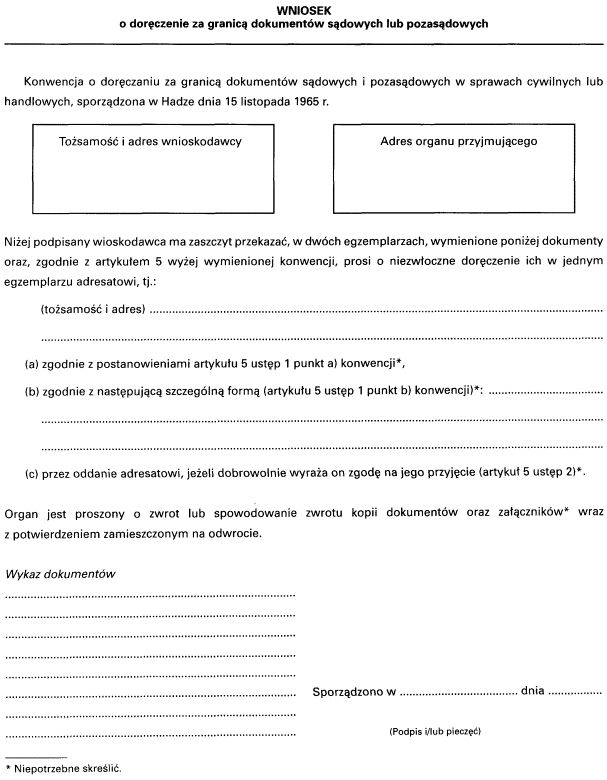
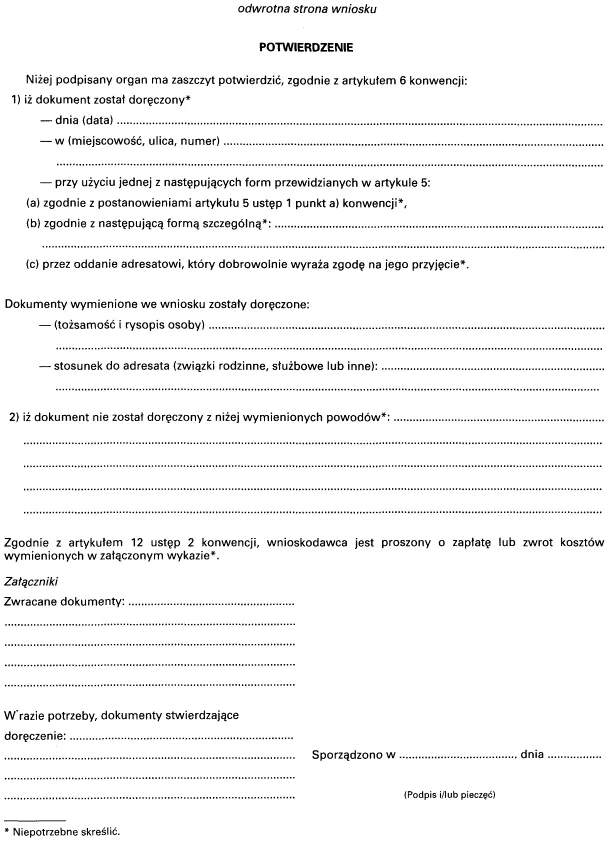
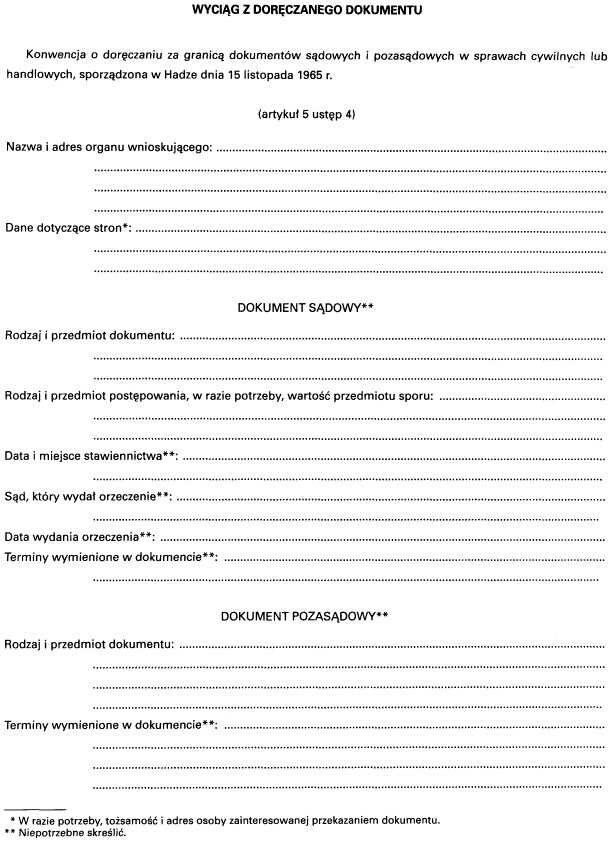
CONVENTION
on the service abroad of judicial and extrajudicial documents in civil or commercial matters
The States signatory to the present Convention,
Desiring to create appropriate means to ensure that judicial and extrajudicial documents to be served abroad shall be brought to the notice of the addressee in sufficient time,
Desiring to improve the organisation of mutual judicial assistance for that purpose by simplifying and expediting the procedure,
Have resolved to conclude a Convention to this effect and have agreed upon the following provisions:
Article 1
The present Convention shall apply in all cases, in civil or commercial matters, where there is occasion to transmit a judicial or extrajudicial document for service abroad.
This Convention shall not apply where the address of the person to be served with the document is not known.
Chapter l
Judicial documents
Article 2
Each contracting State shall designate a Central Authority which will undertake to receive requests for service coming from other contracting States and to proceed in conformity with the provisions of articles 3 to 6.
Each State shall organise the Central Authority in conformity with its own law.
Article 3
The authority or judicial officer competent under the law of the State in which the documents originate shall forward to the Central Authority of the State addressed a request conforming to the model annexed to the present Convention, without any requirement of legalisation or other equivalent formality.
The document to be served or a copy thereof shall be annexed to the request. The request and the document shall both be furnished in duplicate.
Article 4
If the Central Authority considers that the request does not comply with the provisions of the present Convention it shall promptly inform the applicant and specify its objections to the request.
Article 5
The Central Authority of the State addressed shall itself serve the document or shall arrange to have it served by an appropriate agency, either –
(a) by a method prescribed by its internal law for the service of documents in domestic actions upon persons who are within its territory, or
.(b) by a particular method requested by the applicant, unless such a method is incompatible with the law of the State addressed.
Subject to sub-paragraph (b) of the first paragraph of this article, the document may always be served by delivery to an addressee who accepts it voluntarily.
If the document is to be served under the first paragraph above, the Central Authority may require the document to be written in, or translated into, the official language or one of the official languages of the State addressed.
That part of the request, in the form attached to the present Convention, which contains a summary of the document to be served, shall be served with the document.
Article 6
The Central Authority of the State addressed or any authority which it may have designated for that purpose, shall complete a certificate in the form of the model annexed to the present Convention.
The certificate shall state that the document has been served and shall include the method, the place and the date of service and the person to whom the document was delivered. If the document has not been served, the certificate shall set out the reasons which have prevented service.
The applicant may require that a certificate not completed by a Central Authority or by a judicial authority shall be countersigned by one of these authorities.
The certificate shall be forwarded directly to the applicant.
Article 7
The standard terms in the model annexed to the present Convention shall in all cases be written either in French or in English. They may also be written in the official language, or in one of the official languages, of the State in which the documents originate.
The corresponding blanks shall be completed either in the language of the State addressed or in French or in English.
Article 8
Each contracting State shall be free to effect service of judicial documents upon persons abroad, without application of any compulsion, directly through its diplomatic or consular agents.
Any State may declare that it is opposed to such service within its territory, unless the document is to be served upon a national of the State in which the documents originate.
Article 9
Each contracting State shall be free, in addition, to use consular channels to forward documents, for the purpose of service, to those authorities of another contracting State which are designated by the latter for this purpose.
Each contracting State may, if exceptional circumstances so require, use diplomatic channels for the same purpose.
Article 10
Provided the State of destination does not object, the present Convention shall not interfere with –
(a) the freedom to send judicial documents, by postal channels, directly to persons abroad,
(b) the freedom of judicial officers, officials or other competent persons of the State of origin to effect service of judicial documents directly through the judicial officers, officials or other competent persons of the State of destination,
(c) the freedom of any person interested in a judicial proceeding to effect service of judicial documents directly through the judicial officers, officials or other competent persons of the State of destination.
Article 11
The present Convention shall not prevent two or more contracting States from agreeing to permit, for the purpose of service of judicial documents, channels of transmission other than those provided for in the preceding articles and, in particular, direct communication between their respective authorities.
Article 12
The service of judicial documents coming from a contracting State shall not give rise to any payment or reimbursement of taxes or costs for the services rendered by the State addressed.
The applicant shall pay or reimburse the costs occasioned by –
(a) the employment of a judicial officer or of a person competent under the law of the State of destination,
(b) the use of a particular method of service.
Article 13
Where a request for service complies with the terms of the present Convention, the State addressed may refuse to comply therewith only if it deems that compliance would infringe its sovereignty or security.
It may not refuse to comply solely on the ground that, under its internal law, it claims exclusive jurisdiction over the subject-matter of the action or that its internal law would not permit the action upon which the application is based.
The Central Authority shall, in case of refusal, promptly inform the applicant and state the reasons for the refusal.
Article 14
Difficulties which may arise in connection with the transmission of judicial documents for service shall be settled through diplomatic channels.
Article 15
Where a writ of summons or an equivalent document had to be transmitted abroad for the purpose of service, under the provisions of the present Convention, and the defendant has not appeared, judgment shall not be given until it is established that –
(a) the document was served by a method prescribed by the internal law of the State addressed for the service of documents in domestic actions upon persons who are within its territory, or
(b) the document was actually delivered to the defendant or to his residence by another method provided for by this Convention,
and that in either of these cases the service or the delivery was effected in sufficient time to enable the defendant to defend.
Each contracting State shall be free to declare that the judge, notwithstanding the provisions of the first paragraph of this article, may give judgment even if no certificate of service or delivery has been received, if all the following conditions are fulfilled –
(a) the document was transmitted by one of the methods provided for in this Convention,
(b) a period of time of not less than six months, considered adequate by the judge in the particular case, has elapsed since the date of the transmission of the document,
(c) no certificate of any kind has been received, even though every reasonable effort has been made to obtain it through the competent authorities of the State addressed.
Notwithstanding the provisions of the preceding paragraphs the judge may order, in case of urgency, any provisional or protective measures.
Article 16
When a writ of summons or an equivalent document had to be transmitted abroad for the purpose of service, under the provisions of the present Convention, and a judgment has been entered against a defendant who has not appeared, the judge shall have the power to relieve the defendant from the effects of the expiration of the time for appeal from the judgment if the following conditions are fulfilled –
(a) the defendant, without any fault on his part, did not have knowledge of the document in sufficient time to defend, or knowledge of the judgment in sufficient time to appeal, and
(b) the defendant has disclosed a prima facie defence to the action on the merits.
An application for relief may be filed only within a reasonable time after the defendant has knowledge of the judgment.
Each contracting State may declare that the application will not be entertained if it is filed after the expiration of a time to be stated in the declaration, but which shall in no case be less than one year following the date of the judgment.
This article shall not apply to judgments concerning status or capacity of persons.
Chapter II
Extrajudicial documents
Article 17
Extrajudicial documents emanating from authorities and judicial officers of a contracting State may be transmitted for the purpose of service in another contracting State by the methods and under the provisions of the present Convention.
Chapter III
General clauses
Article 18
Each contracting State may designate other authorities in addition to the Central Authority and shall determine the extent of their competence.
The applicant shall, however, in all cases, have the right to address a request directly to the Central Authority.
Federal States shall be free to designate more than one Central Authority.
Article 19
To the extent that the internal law of a contracting State permits methods of transmission, other than those provided for in the preceding articles, of documents coming from abroad, for service within its territory, the present Convention shall not affect such provisions.
Article 20
The present Convention shall not prevent an agreement between any two or more contracting States to dispense with –
(a) the necessity for duplicate copies of transmitted documents as required by the second paragraph of article 3,
(b) the language requirements of the third paragraph of article 5 and article 7,
(c) the provisions of the fourth paragraph of article 5,
(d) the provisions of the second paragraph of article 12.
Article 21
Each contracting State shall, at the time of the deposit of its instrument of ratification or accession, or at a later date, inform the Ministry of Foreign Affairs of the Netherlands of the following –
(a) the designation of authorities, pursuant to articles 2 and 18,
(b) the designation of the authority competent to complete the certificate pursuant to article 6,
(c) the designation of the authority competent to receive documents transmitted by consular channels, pursuant to article 9.
Each contracting State shall similarly inform the Ministry, where appropriate, of –
(a) opposition to the use of methods of transmission pursuant to articles 8 and 10,
(b) declarations pursuant to the second paragraph of article 15 and the third paragraph of article 16,
(c) all modifications of the above designations, oppositions and declarations.
Article 22
Where Parties to the present Convention are also Parties to one or both of the Conventions on civil procedure signed at The Hague on 17th July 1905, and on 1st March 1954, this Convention shall replace as between them articles 1 to 7 of the earlier Conventions.
Article 23
The present Convention shall not affect the application of article 23 of the Convention on civil procedure signed at The Hague on 17th July 1905, or of article 24 of the Convention on civil procedure signed at The Hague on 1st March 1954.
These articles shall, however, apply only if methods of communication, identical to those provided for in these Conventions, are used.
Article 24
Supplementary agreements between parties to the Conventions of 1905 and 1954 shall be considered as equally applicable to the present Convention, unless the Parties have otherwise agreed.
Article 25
Without prejudice to the provisions of articles 22 and 24, the present Convention shall not derogate from Conventions containing provisions on the matters governed by this Convention to which the contracting States are, or shall become. Parties.
Article 26
The present Convention shall be open for signature by the States represented at the Tenth Session of the Hague Conference on Private International Law.
It shall be ratified, and the instruments of ratification shall be deposited with the Ministry of Foreign Affairs of the Netherlands.
Article 27
The present Convention shall enter into force on the sixtieth day after the deposit of the third instrument of ratification referred to in the second paragraph of article 26.
The Convention shall enter into force for each signatory State which ratifies subsequently on the sixtieth day after the deposit of its instrument of ratification.
Article 28
Any State not represented at the Tenth Session of the Hague Conference on Private International Law may accede to the present Convention after it has entered into force in accordance with the first paragraph of article 27. The instrument of accession shall be deposited with the Ministry of Foreign Affairs of the Netherlands.
The Convention shall enter into force for such a State in the absence of any objection from a State, which has ratified the Convention before such deposit, notified to the Ministry of Foreign Affairs of the Netherlands within a period of six months after the date on which the said Ministry has notified it of such accession.
In the absence of any such objection, the Convention shall enter into force for the acceding State on the first day of the month following the expiration of the last of the periods referred to in the preceding paragraph.
Article 29
Any State may, at the time of signature, ratification or accession, declare that the present Convention shall extend to all the territories for the international relations of which it is responsible, or to one or more of them. Such a declaration shall take effect on the date of entry into force of the Convention for the State concerned.
At any time thereafter, such extensions shall be notified to the Ministry of Foreign Affairs of the Netherlands.
The Convention shall enter into force for the territories mentioned in such an extention on the sixtieth day after the notification referred to in the preceding paragraph.
Article 30
The present Convention shall remain in force for five years from the date of its entry into force in accordance with the first paragraph of article 27, even for States which have ratified it or acceded to it subsequently.
If there has been no denunciation, it shall be renewed tacitly every five years.
Any denunciation shall be notified to the Ministry of Foreign Affairs of the Netherlands at least six months before the end of the five year period.
It may be limited to certain of the territories to which the Convention applies.
The denunciation shall have effect only as regards the State which has notified it. The Convention shall remain in force for the other contracting States.
Article 31
The Ministry of Foreign Affairs of the Netherlands shall give notice to the States referred to in article 26, and to the States which have acceded in accordance with article 28, of the following –
(a) the signatures and ratifications referred to in article 26;
(b) the date on which the present Convention enters into force in accordance with the first paragraph of article 27;
c) the accessions referred to in article 28 and the dates on which they take effect;
(d) the extensions referred to in article 29 and the dates on which they take effect;
(e) the designations, oppositions and declarations referred to in article 21;
(f) the denunciations referred to in the third paragraph of article 30.
In witness whereof the undersigned, being duly authorised thereto, have signed the present Convention.
Done at The Hague, on the 15th day of November, 1965, in the English and French languages, both texts being equally authentic, in a single copy which shall be deposited in the archives of the Government of the Netherlands, and of which a certified copy shall be sent, through the diplomatic channel, to each of the States represented at the Tenth Session of the Hague Conference on Private International Law.
ANNEX TO THE CONVENTION
(język angielski)
Forms
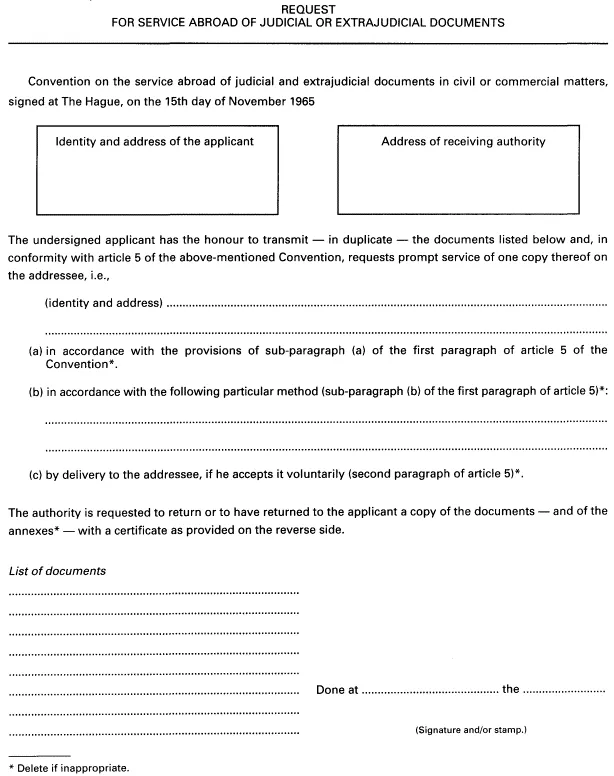
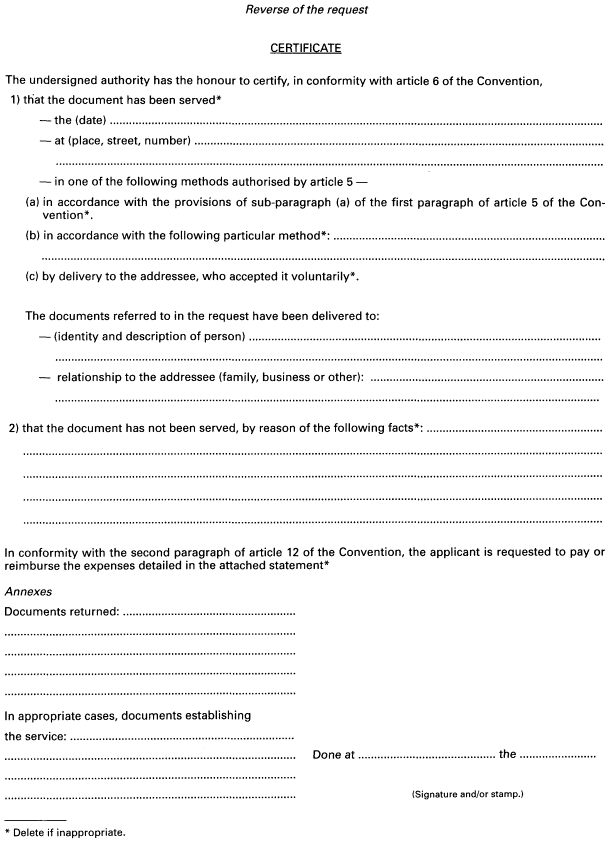
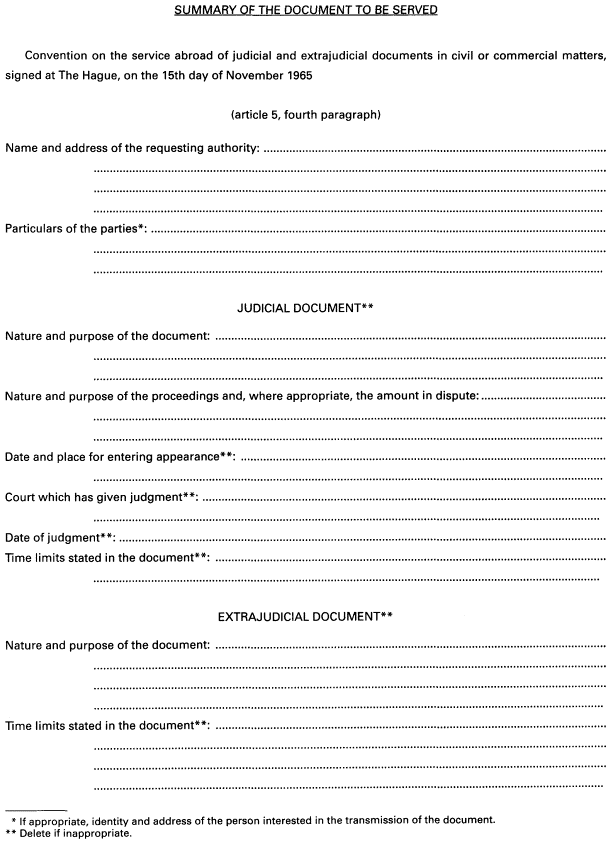
CONVENTION
relative à la signification et la notification à l'étranger des actes judiciaires et extrajudiciaires en matière civile ou commerciale
Les Etats signataires de la présente Convention,
Désirant créer les moyens appropriés pour que les actes judiciaires et extrajudiciaires qui doivent être signifiés ou notifiés à l'étranger soient connus de leurs destinataires en temps utile,
Soucieux d'améliorer à cette fin l'entraide judiciaire mutuelle en simplifiant et en accélérant la procédure,
Ont résolu de conclure une Convention à ces effets et sont convenus des dispositions suivantes:
Article premier
La présente Convention est applicable, en matière civile ou commerciale, dans tous les cas où un acte judiciaire ou extrajudiciaire doit être transmis à l'étranger pour y être signifié ou notifié.
La Convention ne s'applique pas lorsque l'adresse du destinataire de l'acte n'est pas connue.
Chapitre 1
Actes judiciaires
Article 2
Chaque Etat contractant désigne une Autorité centrale qui assume, conformément aux articles 3 à 6, la charge de recevoir les demandes de signification ou de notification en provenance d'un autre Etat contractant et d'y donner suite.
L'Autorité centrale est organisée selon les modalités prévues par l'Etat requis.
Article 3
L'autorité ou l'officier ministériel compétents selon les lois de l'Etat d'origine adresse à l'Autorité centrale de l'Etat requis une demande conforme à la formule modèle annexée à la présente Convention, sans qu'il soit besoin de la légalisation des pièces ni d'une autre formalité équivalente.
La demande doit être accompagnée de l'acte judiciaire ou de sa copie, le tout en double exemplaire.
Article 4
Si l'Autorité centrale estime que les dispositions de la Convention n'ont pas été respectées, elle en informe immédiatement le requérant en précisant les griefs articulés à rencontre de la demande.
Article 5
L'Autorité centrale de l'Etat requis procède ou fait procéder à la signification ou à la notification de l'acte:
a) soit selon les formes prescrites par la législation de l'Etat requis pour la signification ou la notification des actes dressés dans ce pays et qui sont destinés aux personnes se trouvant sur son territoire,
b) soit selon la forme particulière demandée par le requérant, pourvu que celle-ci ne soit pas incompatible avec la loi de l'Etat requis.
Sauf le cas prévu à l'alinéa premier, lettre b), l'acte peut toujours être remis au destinataire qui l'accepte volontairement.
Si l'acte doit être signifié ou notifié conformément à l'alinéa premier, l'Autorité centrale peut demander que l'acte soit rédigé ou traduit dans la langue ou une des langues officielles de son pays.
La partie de la demande conforme à la formule modèle annexée à la présente Convention, qui contient les éléments essentiels de l'acte, est remise au destinataire.
Article 6
L'Autorité centrale de l'Etat requis ou toute autorité qu'il aura désignée à cette fin établit une attestation conforme à la formule modèle annexée à la présente Convention.
L'attestation relate l'exécution de la demande; elle indique la forme, le lieu et la date de l'exécution ainsi que la personne à laquelle l'acte a été remis. Le cas échéant, elle précise le fait qui aurait empêché l'exécution.
Le requérant peut demander que l'attestation qui n'est pas établie par l'Autorité centrale ou par une autorité judiciaire soit visée par l'une de ces autorités.
L'attestation est directement adressée au requérant.
Article 7
Les mentions imprimées dans la formule modèle anexée à la présente Convention sont obligatoirement rédigées soit en langue française, soit en langue anglaise. Elles peuvent, en outre, être rédigées dans la langue ou une des langues officielles de l'Etat d'origine.
Les blancs correspondant à ces mentions sont remplis soit dans la langue de l'Etat requis, soit en langue française, soit en langue anglaise.
Article 8
Chaque Etat contractant a la faculté de faire procéder directement, sans contrainte, par les soins de ses agents diplomatiques ou consulaires, aux significations ou notifications d'actes judiciaires aux personnes se trouvant à l'étranger.
Tout Etat peut déclarer s'opposer à l'usage de cette faculté sur son territoire, sauf si l'acte doit être signifié ou notifié à un ressortissant de l'Etat d'origine.
Article 9
Chaque Etat contractant a, de plus, la faculté d'utiliser la voie consulaire pour transmettre, aux fins de signification ou de notification, des actes judiciaires aux autorités d'un autre Etat contractant que celui-ci a désignées.
Si des circonstances exceptionnelles l'exigent, chaque Etat contractant a la faculté d'utiliser, aux mêmes fins, la voie diplomatique.
Article 10
La présente Convention ne fait pas obstacle, sauf si l'Etat de destination déclare s'y opposer:
a) à la faculté d'adresser directement, par la voie de la poste, des actes judiciaires aux personnes se trouvant à l'étranger,
b) à la faculté, pour les officiers ministériels, fonctionnaires ou autres personnes compétents de l'Etat d'origine, de faire procéder à des significations ou notifications d'actes judiciaires directement par les soins des officiers ministériels, fonctionnaires ou autres personnes compétents de l'Etat de destination,
c) à la faculté, pour toute personne intéressée à une instance judiciaire, de faire procéder à des significations ou notifications d'actes judiciaires directement par les soins des officiers ministériels, fonctionnaires ou autres personnes compétents de l'Etat de destination.
Article 11
La présente Convention ne s'oppose pas à ce que des Etats contractants s'entendent pour admettre, aux fins de signification ou de notification des actes judiciaires, d'autres voies de transmission que celles prévues par les articles qui précèdent et notamment la communication directe entre leurs autorités respectives.
Article 12
Les significations ou notifications d'actes judiciaires en provenance d'un Etat contractant ne peuvent donner lieu au paiement ou au remboursement de taxes ou de frais pour les services de l'Etat requis.
Le requérant est tenu de payer ou de rembourser les frais occasionnés par:
a) l'intervention d'un officier ministériel ou d'une personne compétente selon la loi de l'Etat de destination,
b) l'emploi d'une forme particulière.
Article 13
L'exécution d'une demande de signification ou de notification conforme aux dispositions de la présente Convention ne peut être refusée que si l'Etat requis juge que cette exécution est de nature à porter atteinte à sa souveraineté ou à sa sécurité.
L'exécution ne peut être refusée pour le seul motif que la loi de l'Etat requis revendique la compétence judiciaire exclusive dans l'affaire en cause ou ne connaît pas de voie de droit répondant à l'objet de la demande.
En cas de .refus, l'Autorité centrale en informe immédiatement le requérant et indique les motifs.
Article 14
Les difficultés qui s'élèveraient à l'occasion de la transmission, aux fins de signification ou de notification, d'actes judiciaires seront réglées par la voie diplomatique.
Article 15
Lorsqu'un acte introductif d'instance ou un acte équivalent a dû être transmis à l'étranger aux fins de signification ou de notification, selon les dispositions de la présente Convention, et que le défendeur ne comparaît pas, le juge est tenu de surseoir à statuer aussi longtemps qu'il n'est pas établi:
a) ou bien que l'acte a été signifié ou notifié selon les formes prescrites par la législation de l'Etat requis pour la signification ou la notification des actes dressés dans ce pays et qui sont destinés aux personnes se trouvant sur son territoire,
b) ou bien que l'acte a été effectivement remis au défendeur ou à sa demeure selon un autre procédé prévu par la présente Convention,
et que, dans chacune de ces éventualités, soit la signification ou la notification, soit la remise a eu lieu en pour que le défendeur ait pu se défendre.
Chaque Etat contractant a la faculté de déclarer que ses juges, nonobstant les dispositions de l'alinéa premier, peuvent statuer si les conditions suivantes sont réunies, bien qu'aucune attestation constatant soit la signification ou la notification, soit la remise, n'ait été reçue:
a) l'acte a été transmis selon un des modes prévus par la présente Convention,
b) un délai que le juge appréciera dans chaque cas particulier et qui sera d'au moins six mois, s'est écoulé depuis la date d'envoi de l'acte,
c) nonobstant toutes diligences utiles auprès des autorités compétentes de l'Etat requis, aucune attestation n'a pu être obtenue.
Le présent article ne fait pas obstacle à ce qu'en cas d'urgence, le juge ordonne toutes mesures provisoires ou conservatoires.
Article 16
Lorsqu'un acte introductif d'instance ou un acte équivalent a dû être transmis à l'étranger aux fins de signification ou de notification, selon les dispositions de la présente Convention, et qu'une décision a été rendue contre un défendeur qui n'a pas comparu, le juge a la faculté de relever ce défendeur de la forclusion résultant de l'expiration des délais de recours, si les conditions suivantes sont réunies:
a) le défendeur, sans qu'il y ait eu faute de sa part, n'a pas eu connaissance en temps utile dudit acte pour se défendre et de la décision pour exercer un recours,
b) les moyens du défendeur n'apparaissent pas dénués de tout fondement.
La demande tendant au relevé de la forclusion est irrecevable si elle n'est pas formée dans un délai raisonnable à partir du moment où le défendeur a eu connaissance de la décision.
Chaque Etat contractant a la faculté de déclarer que cette demande est irrecevable si elle est formée après, l'expiration d'un délai qu'il précisera dans sa déclaration, pourvu que ce délai ne soit pas inférieur à un an à compter du prononcé de la décision.
Le présent article ne s'applique pas aux décisions concernant l'état des personnes.
Chapitre II
Actes extrajudiciaires
Article 17
Les actes extrajudiciaires émanant des autorités et officiers ministériels d'un Etat contractant peuvent être transmis aux fins de signification ou de notification dans un autre Etat contractant selon les modes et aux conditions prévus par la présente Convention.
Chapitre III
Dispositions générales
Article 18
Tout Etat contractant peut désigner, outre l'Autorité centrale, d'autres autorités dont il détermine les compétences.
Toutefois, le requérant a toujours le droit de s'adresser directement à l'Autorité centrale.
Les Etats fédéraux ont la faculté de désigner plusieurs Autorités centrales.
Article 19
La présente Convention ne s'oppose pas à ce que la loi interne d'un Etat contractant permette d'autres formes de transmission non prévues dans les articles précédents, aux fins de signification ou de notification, sur son territoire, des actes venant de l'étranger.
Article 20
La présente Convention ne s'oppose pas à ce que des Etats contractants s'entendent pour déroger:
a) à l'article 3, alinéa 2, en ce qui concerne l'exigence du double exemplaire des pièces transmises,
b) à l'article 5, alinéa 3, et à l'article 7, en ce qui concerne l'emploi des langues,
c) à l'article 5, alinéa 4,
d) à l'article 12, alinéa 2.
Article 21
Chaque Etat contractant notifiera au Ministère des Affaires Etrangères des Pays-Bas soit au moment du dépôt de son instrument de ratification ou d'adhésion, soit ultérieurement:
a) la désignation des autorités prévues aux articles 2 et 18;
b) la désignation de l'autorité compétente pour établir l'attestation prévue à l'article 6;
c) la désignation de l'autorité compétente pour recevoir les actes transmis par la voie consulaire selon l'article 9.
Il notifiera, le cas échéant, dans les mêmes conditions:
a) son opposition à l'usage des voies de transmission prévues aux articles 8 et 10,
b) les déclarations prévues aux articles 15, alinéa 2, et 16, alinéa 3,
c) toute modification des désignations, opposition et déclarations mentionnées ci- dessus.
Article 22
La présente Convention remplacera dans les rapports entre les Etats qui l'auront ratifiée, les articles 1 à 7 des Conventions relatives à la procédure civile, respectivement signées à La Haye, le 17 juillet 1905 et le premier mars 1954, dans la mesure où lesdits Etats sont Parties à l'une ou à l'autre de ces Conventions.
Article 23
La présente Convention ne porte pas atteinte à l'application de l'article 23 de la Convention relative à la procédure civile, signée à La Haye, le 17 juillet 1905, ni de l'article 24 de celle signée à La Haye, le premier mars 1954.
Ces articles ne sont toutefois applicables que s'il est fait usage de modes de communication identiques à ceux prévus par lesdites Conventions.
Article 24
Les accords additionnels auxdites Conventions de 1905 et de 1954, conclus par les Etats contractants, sont considérés comme également applicables à la présente Convention à moins que les Etats intéressés n'en conviennent autrement.
Article 25
Sans préjudice de l'application des articles 22 et 24, la présente Convention ne déroge pas aux Conventions auxquelles les Etats contractants sont ou seront Parties et qui contiennent des dispositions sur les matières réglées par la présente Convention.
Article 26
La présente Convention est ouverte à la signature des Etats représentés à la Dixième session de la Conférence de La Haye de droit international privé.
Elle sera ratifiée et les instruments de ratification seront déposés auprès du Ministère des Affaires Etrangères des Pays-Bas.
Article 27
La présente Convention entrera en vigueur le soixantième jour après le dépôt du troisième instrument de ratification prévu par l'article 26, alinéa 2.
La Convention entrera en vigueur, pour chaque Etat signataire ratifiant postérieurement, le soixantième jour après le dépôt de son instrument de ratification.
Article 28
Tout Etat non représenté à la Dixième session de la Conférence de La Haye de droit international privé pourra adhérer à la présente Convention après son entrée en vigueur en vertu de l'article 27, alinéa premier. L'instrument d'adhésion sera déposé auprès du Ministère des Affaires Etrangères des Pays-Bas.
La Convention n'entrera en vigueur pour un tel Etat qu'à défaut d'opposition de la part d'un Etat ayant ratifié la Convention avant ce dépôt, notifiée au Ministère des Affaires Etrangères des Pays-Bas dans un délai de six mois à partir de la date à laquelle ce Ministère lui aura notifié cette adhésion.
A défaut d'opposition, la Convention entrera en vigueur pour l'Etat adhérant le premier jour du mois qui suit l'expiration du dernier des délais mentionnés à l'alinéa précédent.
Article 29
Tout Etat, au moment de la signature, de la ratification ou de l'adhésion, pourra déclarer que la présente Convention s'étendra à l'ensemble des territoires qu'il représente sur le plan international, ou à l'un ou plusieurs d'entre eux. Cette déclaration aura effet au moment de l'entrée en vigueur de la Convention pour ledit Etat.
Par la suite, toute extension de cette nature sera notifiée au Ministère des Affaires Etrangères des Pays-Bas.
La Convention entrera en vigueur, pour les territoires visés par l'extension, le soixantième jour après la notification mentionnée à l'alinéa précédent.
Article 30
La présente Convention aura une durée de cinq ans à partir de la date de son entrée en vigueur conformément à l'article 27, alinéa premier, même pour les Etats qui l'auront ratifiée ou y auront adhéré postérieurement.
La Convention sera renouvelée tacitement de cinq en cinq ans, sauf dénonciation.
La dénonciation sera, au moins six mois avant l'expiration du délai de cinq ans, notifiée au Ministère des Affaires Etrangères des Pays-Bas.
Elle pourra se limiter à certains des territoires auxquels s'applique la Convention.
La dénonciation n'aura d'effet qu'à l'égard de l'Etat qui l'aura notifiée. La Convention restera en vigueur pour les autres Etats contractants.
Article 31
Le Ministère des Affaires Etrangères des Pays-Bas notifiera aux Etats visés à l'article 26, ainsi qu'aux Etats qui auront adhéré conformément aux dispositions de l'article 28:
a) les signatures et ratifications visées à l'article 26;
b) la date à laquelle la présente Convention entrera en vigueur conformément aux dispositions de l'article 27, alinéa premier;
c) les adhésions visées à l'article 28 et la date à laquelle elles auront effet;
d) les extensions visées à l'article 29 et la date à laquelle elles auront effet;
e) les désignations, opposition et déclarations mentionnées à l'article 21;
f) les dénonciations visées à l'article 30, alinéa 3.
En foi de quoi, les soussignés, dûment autorisés, ont signé la présente Convention.
Fait à La Haye, le 15 novembre 1965, en français et en anglais, les deux textes faisant également foi, en un seul exemplaire, qui sera déposé dans les archives du Gouvernement des Pays-Bas et dont une copie certifiée conforme sera remise, par la voie diplomatique, à chacun des Etats représentés à la Dixième session de la Conférence de La Haye de droit international privé.
ANNEXE À LA CONVENTION
(język francuski)
Formules de demande et d'attestation
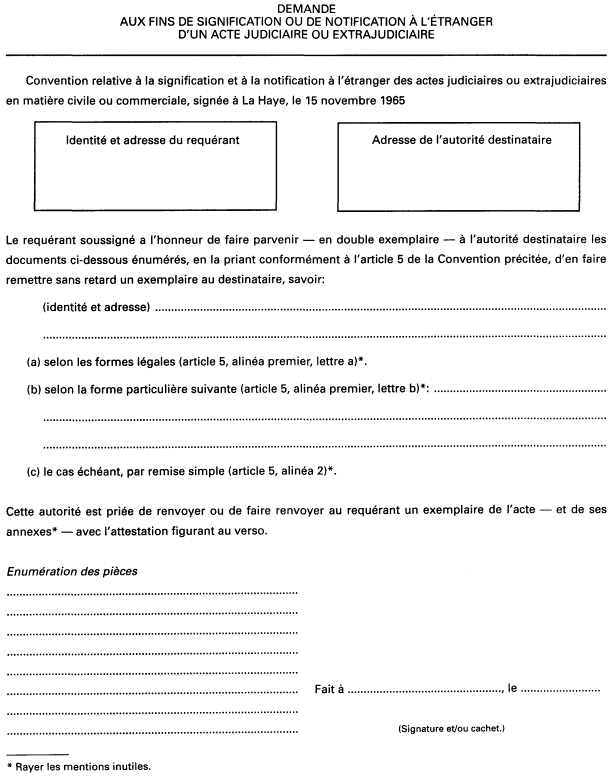
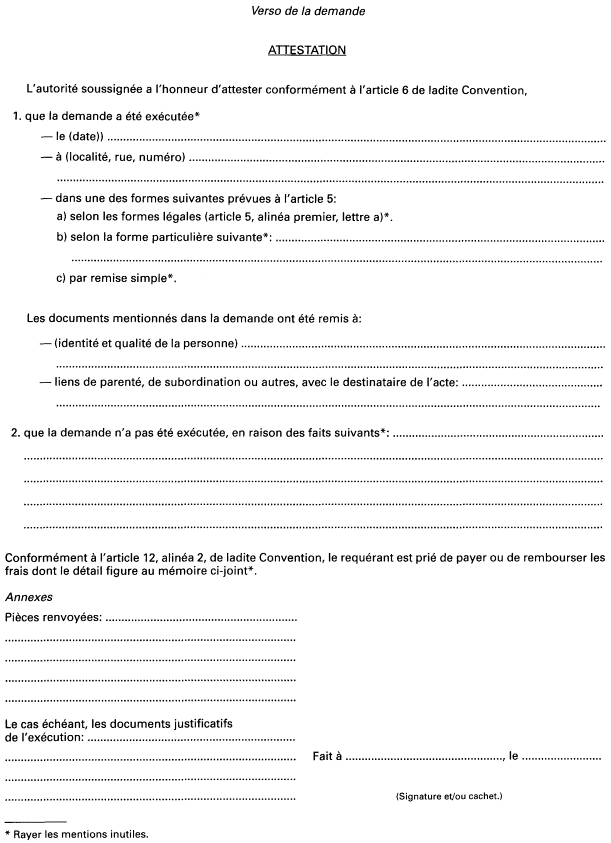
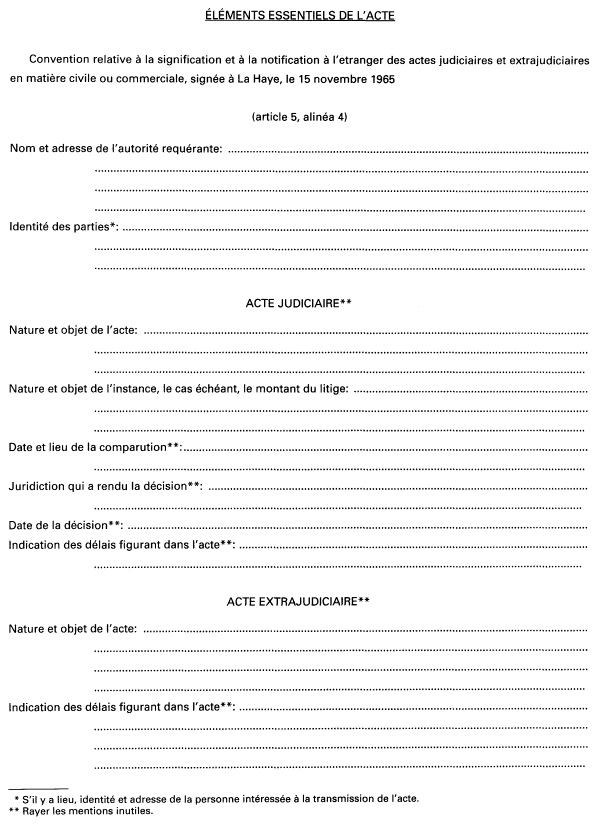
Po zaznajomieniu się z powyższą konwencją, w imieniu Rzeczypospolitej Polskiej oświadczam, że:
– konwencja została uznana za słuszną;
– Rzeczpospolita Polska postanawia przystąpić do tej konwencji, oświadczając, że sprzeciwia się stosowaniu na swym terytorium sposobów doręczania dokumentów przewidzianych w artykułach 8 i 10;
– z uwzględnieniem załączonego sprzeciwu konwencja będzie niezmiennie zachowywana
Na dowód czego wydany został akt niniejszy, opatrzony pieczęcią Rzeczypospolitej Polskiej.
Dano w Warszawie dnia 26 października 1995 r.
Prezydent Rzeczypospolitej Polskiej: L. Wałęsa
LS.
Minister Spraw Zagranicznych: W. Bartoszewski
- Data ogłoszenia: 2000-10-19
- Data wejścia w życie: 1996-09-01
- Data obowiązywania: 1996-09-01
REKLAMA
Dziennik Ustaw
REKLAMA
REKLAMA

